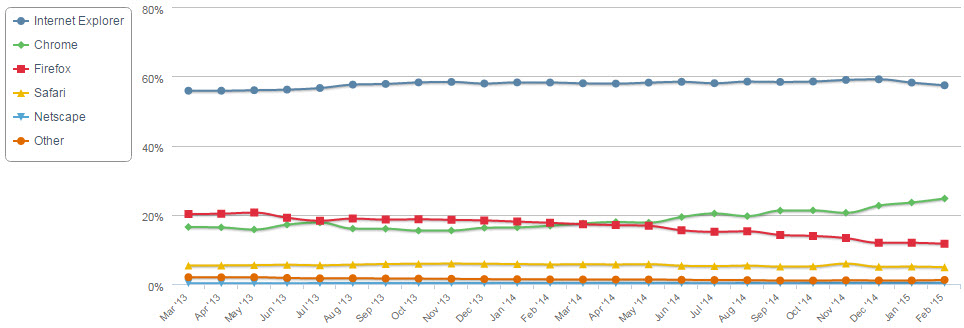Should Mozilla worry about Firefox’s user share?
Every month tech journalists head over to the few sites on the Internet that collect user share data such as Net Market Share or StatCounter to report on the recent month's data.
While the data provided sometimes make good headlines, it is highly problematic for a number of reasons.
If you compare statistics between services you will for instance notice huge discrepancies.
The most recent desktop browser statistics on StatCounter see Chrome leading the field with 48.71% followed by Microsoft's Internet Explorer with 18.91% and Mozilla Firefox with 16.53%.
If you head over to Net Market Share, you have Internet Explorer leading the field with 57.38% followed by Chrome with 24.69% and Firefox with 11.60%.
Even statistics f a single service are highly problematic as you only get percentages but no information about the data source itself.
Did users increase, decrease or stay nearly constant in the period of time analyzed? Where did those users come from, did that change as well?

Gregg Keizer reported recently that Mozilla is bleeding user share and based his findings on the data provided by Net Market Share.
It certainly looks grim if you base your analysis solely on the data provided by the company but for the reasons given above, it is not an accurate analysis.
Without access to Mozilla's own data, it is impossible to come to that conclusion. Even though those services report a drop in usage share, it does not necessarily mean that Firefox usage share dropped as there can be other reasons for that.
If tracked users increased in regions where Chrome or Internet Explorer dominate, Firefox's usage share would have dropped.
But even if the user share of Firefox dropped, does that mean that Mozilla is in trouble? Not necessarily as Mozilla never had the goal to become the most popular web browser on this planet.
Mozilla instead started out to break Internet Explorer's stranglehold on the web back in 2004.
David Harrison argued recently that Mozilla should forget about Firefox and concentrate on Thunderbird as it has achieved its goal with Firefox.
Mozilla's position today is a difficult one. It competes with Internet Explorer and Chrome on the desktop, and with Safari and Chrome on mobile devices.
As far as mobile devices are concerned, it is tough to compete against browsers on devices that ship as the default on them, especially if you are limited in what you can bring to the table.
On the desktop, Internet Explorer still has the advantage that it ships with every nearly every copy of Windows.
Chrome is a special case but it too has the advantage that it is promoted at times by Google on several of the world's most visited websites.
In addition to all that, it means competing against Microsoft, Apple and Google, three of the most powerful Internet companies.
Mozilla is a great counterweight to these corporate behemoths, especially on the desktop where Firefox holds considerable market share.
Should Mozilla be worried about a declining usage share?
If usage share is indeed declining, and Mozilla is the only one to know for sure, it is certainly something that the organization needs to analyze to find out why that is happening and find solutions to reverse the trend.
One way to do that would be to concentrate on core improvements to Firefox that improve the browser for all users.
Mozilla has been criticized in the past for adding features to Firefox that are only of use to some users of the browser. The Social API, Share button or the recent introduction of Firefox Hello for instance.
Whenever a new feature got released, Mozilla was criticized for adding it natively to the browser and not making it available via add-ons instead.
Improvements to add-on compatibility, the browser's memory usage or stability would certainly be welcome by the majority of users.
Now You: Should Mozilla be worried?
This article was first seen on ComTek's "TekBits" Technology News

- Log in to post comments